Exit Pursued by Bear
Timon of Athens and Tim of Alaska: different ways of dying in the wilderness [1500 words 6 mins
Timon will to the woods, where he shall find
Th' unkindest beast more kinder than mankind.
Timon of Athens IV, 1
Voice over: There are people in this world who go looking for adventure.
(Cut to McCandless in the Grand Canyon rapids. McCandless: Whoo-hoo-hoo!)
Christopher McCandless was searching for… himself.
Into the Wild, dir. Sean Penn 2007
Into the Wild, the movie of 2007 directed by Sean Penn following the 1996 book by Jon Krakauer, celebrates some familiar themes: mothy beards, improvised outdoor showers, bear confrontations, dodgy river crossings and very big backpacks. According to the movie, big backpacks are what life is actually all about. Big backpacks are more important than the friends and lovers who don't really understand you, more important than your boring old family who oppress you with $20,000 trust funds, more important than earning your living, more important in the end even than staying alive.
In 1992 Christopher McCandless (played by Emile Hirsch) cut up his credit cards, signed away his trust fund to Oxfam, and headed into the wilderness of Alaska.
In Walden, wilderness wise-guy Henry Thoreau spends 75 pages explaining how he dispensed with his possessions before heading into the suburban wilderness of Walden Pond and building his cabin for the sum of $28 and 12 cents. In his movie, C McC puts it more succinctly. “Why would I want a new car? I don't want any things,” he says to his uncomprehending, desperately respectable Dad.
“Just be out there in it – the wild. No watch, no fucking map.” His fiction hero, from Jack London's The Call of the Wild, is a character called Buck, “strong of muscle and with warm, long hair” – but not an anticipation by 60 years of the hippie look, as Buck is a dog rather than a person. “I read somewhere,” says the McCandless character in the movie, “how important it is in life, not necessarily to be strong, but to feel strong. To measure yourself at least once.”1
Another Alaskan adventurer, Timothy Treadwell, certainly felt strong as he set his tent across a grizzly bear trail and stood tall before the bear, when it arrived, with good thoughts and soothing vibrations. Whether he actually was strong – he certainly wasn't as strong as the elderly and underfed bear that proceeded to pull him down and eat him. His life also made a movie, Grizzly Man of 2005 directed by Werner Herzog.
The trailer is at: https://www.youtube.com/watch?v=uWA7GtDmNFU2
Holed up in an old bus in the middle of Alaska, it is reading Tolstoy's ‘Family Happiness’ that persuades C McC that “happiness is only real when shared”. Thus enlightened, he heads back out of the wilderness. But it is now summer; and, in a development that in a made-up story would be just too obvious, his return to civilisation is cut off by a river now brown and swollen with snowmelt. His map shows a cable tramway less than a mile away – but he hasn’t brought his fucking map. He returns to his home – an abandoned bus in a mosquito swamp, but in the film a finer and rather drier location underneath Denali – and dies of starvation, meanwhile reading Dr Zhivago.
McCandless lived chaste, in emulation of Tolstoy (or rather, in emulation of randy Tolstoy’s writings) and went into the wilderness alone. Treadwell, floppy-haired blond, did manage to gain himself a girlfriend. Which is regrettable, as in the end the bear ate her as well. Regrettable also for the bears – by being eaten, Treadwell caused their deaths too. When the rangers arrived to collect the corpse, Treadwell’s bear thought they looked at least as tasty as Treadwell and started to stalk them, so had to be shot.
The dramatic irony of Treadwell's death by bear, McCandless's thwarted attempt to rejoin humanity: these are best appreciated by critics who are warm, dry, and indoors. The two bad ends do make good movies. The movies, though, are not particularly original. The theme was first explored in 1605, by William Shakespeare.
Not, it’s true, in one of his best plays. Timon of Athens is considered incomplete, poorly constructed, and partly written by Thomas Middleton. Timon gives away his money, not as a gesture of rejection, but out of good-hearted fecklessness. When he goes bankrupt in Act III, his friends desert him and he abandons Athens. Before heading into the woods to live in a cave and eat roots, he offers his false friends a final feast, one of stones and warm water.
…. Live loathed and long,
Most smiling, smooth, detested parasites,
Courteous destroyers, affable wolves, meek bears,
You fools of fortune, trencher-friends, time’s flies,
Cap-and-knee slaves, vapours, and minute-jacks!3
Timon of Athens III 6 93
Timon walks off stage and dies – in one of the play's plot weaknesses, no cause of death is even given apart from its being Act V Scene 3 which in a Shakespeare tragedy is time for the corpse pile. The best of the play, indeed, is the cursing. Only a bit less eloquent than Timon of Athens is Tim of Alaska. In a video made by himself but not used in full by Herzog, Timothy stands on a lake shore ranting to camera against the National Park Service, which had cited him five times for improper food storage and harassing the bears.
How dare they! How dare they challenge me!
How dare they smear me with their campaigns!
How dare they!
When they do not look after these animals.
And I come here in peace and in love, neutral and in respect.
I will continue to do this, I will fight them,
I will be an American dissident if I need be…
There's a patriotic time going on just now
But as far as this fucking government is concerned
Fuck you motherfucking park service.
I beat your fucking arses, I protected the animals, I did!
Fuck you. Fuck you.Video deleted from YouTube for violating terms of use: obscenities bleeped out, reinsertions here are speculative
It's easy to blame those who, like King Lear, head into a particularly bleak bit of moorland in inappropriate gear and without consulting the weather forecast. But the tragic hero in Shakespeare is a larger-than-life figure, admirable and even noble. King Lear, Timon, may be careless about carrying the map and compass: but they are actually undone not by faulty gear but by a fatal character flaw.
And so are McCandless and Treadwell. Treadwell's, McCandless's, error is to feel too much. Any of us can mess up in the great outdoors: but the mistakes of these two emerge, of necessity and inevitably, from their strength. Where in the nineteenth century the Transcendentalists (Thoreau, Whitman, John Muir) took Wordsworth's cult of feeling as far as it'll go, these emoting and supersensitive transcendentalists of today unthinkingly (thinking is bad) take the Transcendentalist programme quite a bit further than that. McCandless: “If we admit that human life can be ruled by reason, the possibility of human life is destroyed.” Feelings are all-important: facts just do not matter.
And as it was for John Muir, but unlike Thoreau and poet Walt Whitman, their wilderness is for real.
“Exit purfued by a Beare” is perhaps the most famous stage direction in Shakespeare. Two tame bears were used in theatrical masques of the time (eg in Ben Jonson's Oberon) and were described as being white. So that Antigonus may have been pursued along the seashore that Bohemia (part of landlocked Hungary) doesn't have, by a polar bear brought back from the Arctic by unicorn (actually narwhal-horn) hunters.
And then to see how the bear tore out his shoulder-bone, how he cried to me for help, and said his name was Antigonus, a nobleman… But how the poor gentleman roared, and the bear mocked him, both roaring louder than sea or weather. I have not winked since I saw these sights: the bear is not yet half dined on the gentleman: he's at it now.
I'll go see if the bear be gone from the gentleman, and how much he hath eaten: they are never curst but when they are hungry: if there be any of him left, I'll bury it.
(winked - blinked; curst - bad-tempered) A Winter's Tale III, 3
‘A Winter's Tale’ is billed as a comedy. But Shakespeare routinely mixed the grotesque and the tragic, the serious and the absurd. In this respect, real life is just like Shakespeare. There's something comical about Treadwell's rant to camera, which for a while you could catch on YouTube – his blond hair flopping around him, nobody listening apart from the the uncomprehending mountainsides and the videotape. But like Timon, like King Lear, he and his lover Amie Huguenard must die in the wild country. And – it's the way of the modern wilderness – the videotape runs on to listen to their screams.
‘Into the Wild’ was Sean Penn’s first film as director. The scenery is magnificent, and authentic Alaska. The screenplay is unsophisticated, relying on voiceover and on extracts from his diary as transcribed into Krakauer’s book.
Substack seems unwilling to embed the Herzog trailer, even though it’s on Youtube. “Grizzly Man” is one of the strongest, and most Herzoggian, of Werner Herzog’s many films.
Cap and knee slave: someone who makes expansive, sweeping bows. Minute-jack: a mechanical figure emerging from a clock to strike the hour; hence, a time-server.



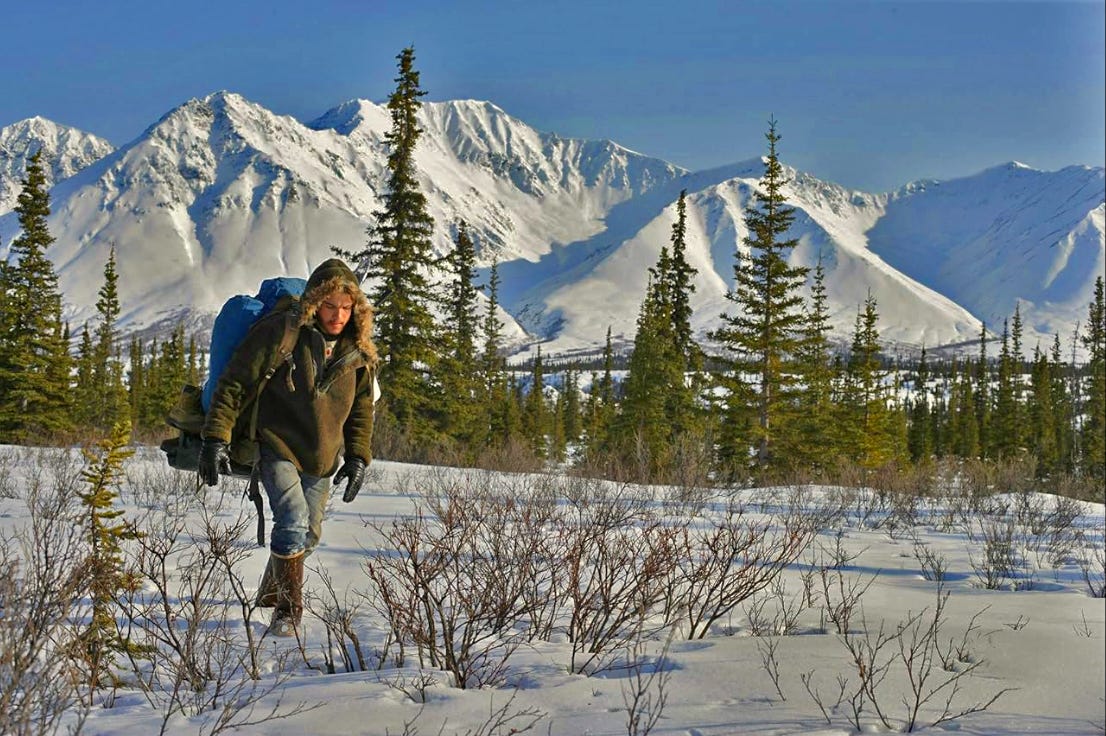
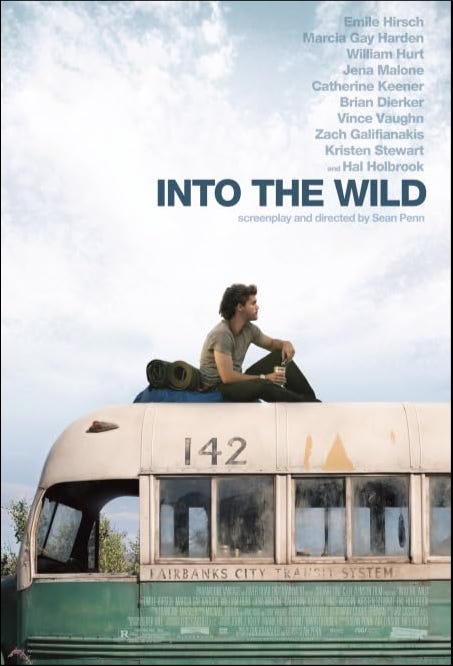
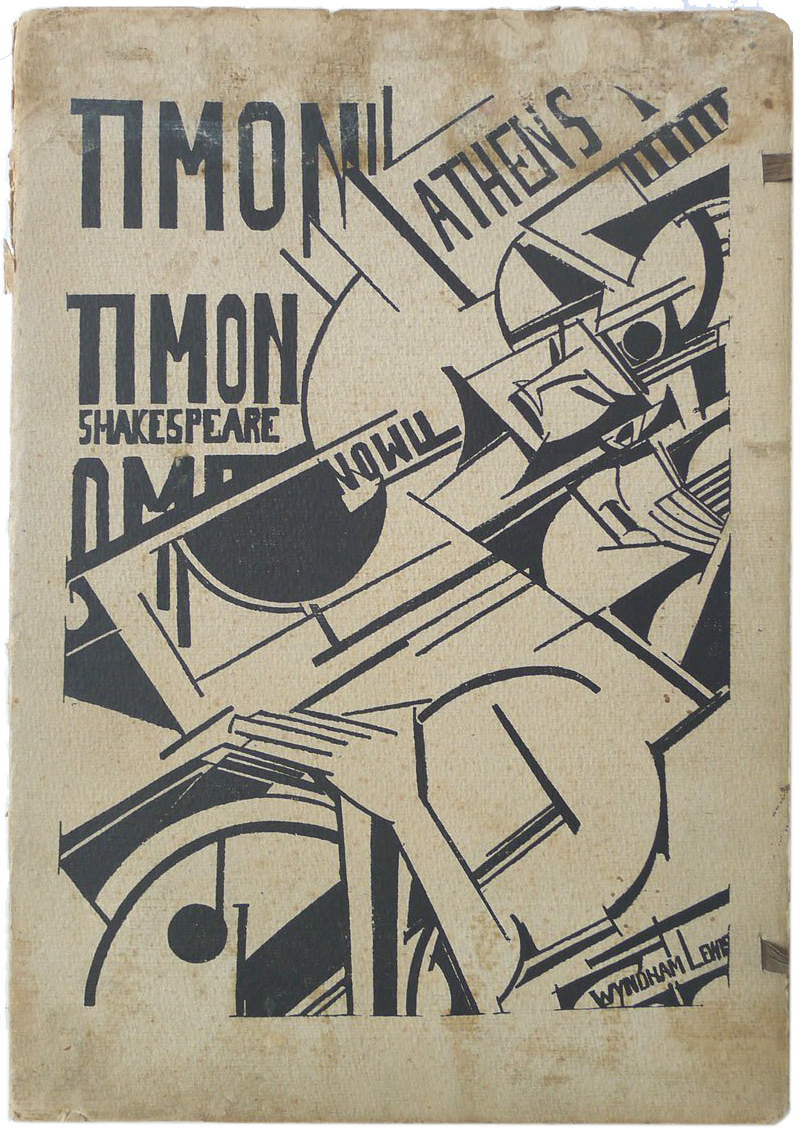
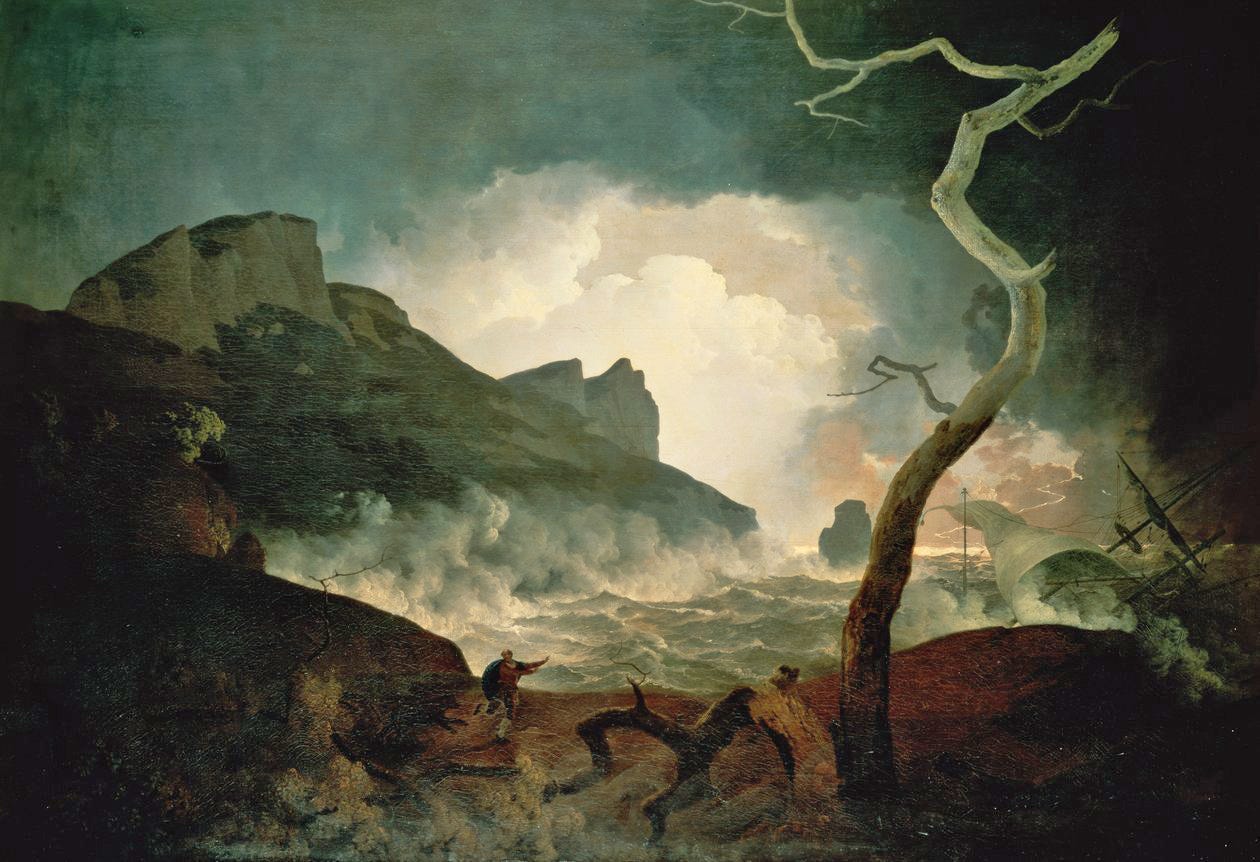
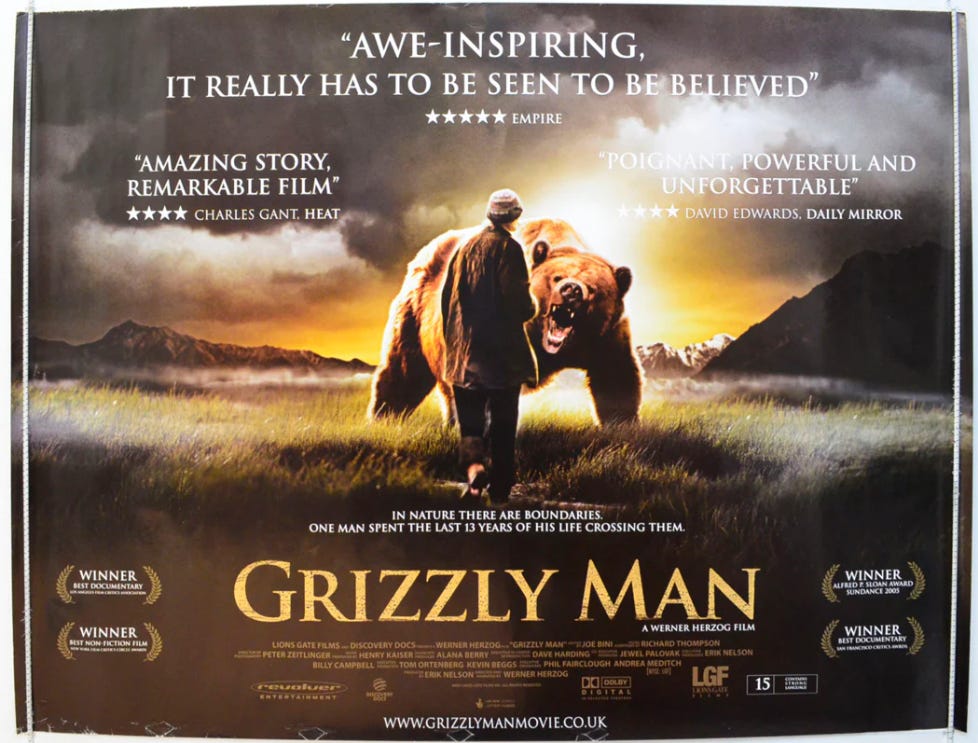
Excellent again. I would never have thought of the Shakespeare connection. (But then I really don’t know Timon of Athens.)
Minor quibble: Bohemia is in the Czech Republic (I double-czeched).
Really enjoyed this, as ever!